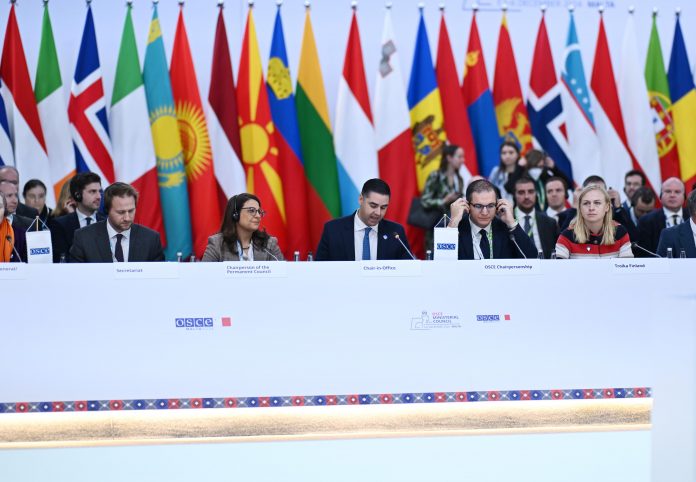Madam Chair, Madam President
Excellencies, Officers in Charge,
Ladies and Gentlemen,
It is an honour to welcome you to the 31st meeting of the OSCE Ministerial Council.
The first hosted by Malta, and a proud milestone in our 60-year history as an independent island nation.
Despite our size, my country has always sought to maximise its contribution to the international community.
35 years ago – almost to the day – George H.W. Bush and Mikhail Gorbachev held their historic meeting on Malta’s stormy shores.
Times have changed fundamentally, but our relations are again defined by intense geopolitical rivalries and threats to European peace and security.
Today, as then, Malta stands as a staunch defender of peace and dialogue in the face of seemingly insurmountable differences and challenges.
In Skopje, you collectively entrusted us with the political leadership of the OSCE at a time of overlapping polycrisis, both for the Organisation and globally.
One year on, my analysis is a sobering one.
This is our third meeting since the beginning of Russia’s war against Ukraine, which continues to pose a systemic threat to European security.
When I outlined our priorities to the Permanent Council in January, I made clear that what we do for peace today will help determine whether we live in war tomorrow.
Tomorrow has come, and little has changed. If anything, the situation has deteriorated.
Security threats – in the OSCE area and beyond – have become even more complex, while global divisions and uncertainties have continued to grow.
Institutionally, we found an OSCE on the brink.
No appointed senior leadership since September, no agreement on who will Chair the Organisation beyond its 50th year, and no Unified Budget since 2021.
The difficulties we face, colleagues, are not unique to the OSCE and have not developed in a vacuum.
They are symptomatic of a broader crisis of our collective commitment to multilateralism.
The principles, rules, and institutions that have underpinned international peace and security for almost 80 years are being questioned, challenged, and actively undermined.
Despite this grim starting point, we were determined to ensure that these testing times would neither breed despair nor resign us to inaction.
We embraced the responsibility of leading this Organisation and have sought to honour the trust placed in us at such a critical juncture.
Here, I would like to recognise the relentless efforts of my Chairpersonship team in Vienna, led by Ambassador Natasha Meli Daudey, and the Foreign Ministry.
We simply would not have made it this far without your perseverance, dedication, and positive energy throughout the year, despite the difficulties you faced with no preparation time.
You have done a tremendous job.
Under our motto “Strengthening Resilience, Enhancing Security”, we have sought to serve as a bridge between North Macedonia and Finland, by reinforcing the pillars of the OSCE and upholding the principles and commitments on which it stands.
As we prepared to host this meeting, we drew inspiration from Malta’s very own Fort Ricasoli and its lighthouse in illustrating this vision.
The lighthouse represents our principles and commitments, providing guidance as we navigate turbulent times. The fort stands for the OSCE’s resilience as a bastion of indivisible security.
Respect for sovereignty and territorial integrity, the inviolability of frontiers, and the non-use of force are four of the central principles guiding relations between OSCE participating States, as set forth in the Helsinki Final Act and the UN Charter.
We continue to condemn the flagrant breaches of these obligations in Russia’s ongoing aggression against Ukraine.
We call on the Russian Federation to withdraw from the internationally recognised territory of Ukraine and end this war.
The recent escalation of attacks must stop immediately to pave the way for a diplomatic process – one that leads to a comprehensive, just, and lasting peace.
I also renew my urgent call for the immediate and unconditional release of our three illegally detained OSCE colleagues: Vadym Golda, Maxim Petrov, and Dmytro Shabanov. This injustice must end, and they must be returned safely to their families.
While this war presents unprecedented challenges, the OSCE has assisted Ukraine’s resilient people in mitigating its impact, including through the Support Programme for Ukraine. It also remains a vital platform for accountability.
This is a testament to the depth, value, and flexibility of the OSCE’s unique conflict management instruments and expertise.
These are ready to be activated to address further consequences of the war and in advancing any future settlement alongside our international partners.
Earlier this year, at the Summit for Peace in Ukraine, I underlined that our Organisation can and should play an important role beyond the “day after”.
Indeed, I am convinced that the OSCE must remain determined to facilitate and accompany a meaningful, result-oriented dialogue to build peace in and for Ukraine.
This is why we have also consistently included the impact of the war on Ukraine in all our initiatives and meetings across all three dimensions.
Colleagues,
In a year full of bumps in the road and different hurdles, we have prevailed in maintaining the OSCE’s principled engagement across its comprehensive approach to security.
Our initiatives and high-level conferences have focussed on key areas. These include building on our work as an elected member of the UN Security Council to advance the Women, Peace, and Security agenda.
In promoting tolerance and non-discrimination, meanwhile, we have placed particular emphasis on the urgent need for interfaith and intercultural dialogue to help bridge the divides between communities.
We have also addressed the effects of climate change and cyber threats on our security, and promoted media literacy and the safety of journalists.
We have relied on the OSCE’s toolbox and expertise in facilitating dialogue, preventing escalation, and promoting stability across the broader OSCE region.
My visits to countries affected by protracted conflicts in our region have shown me once again that the OSCE has the right instruments to address outstanding disagreements and contribute to diplomatic, sustainable solutions.
We have the experience and expertise to accompany those who seek greater security and prosperity.
Ultimately, however, the parties involved must be willing to lay the first brick in building trust and developing these crucial elements of peace.
I had the privilege of visiting almost all of the OSCE’s Field Operations in Eastern Europe, South Eastern Europe, and Central Asia.
Our missions are true success stories, proving that the OSCE can make a difference on the ground.
I highly recommend that you pay them a visit if you are in one of the host countries.
You will be able to see firsthand the dedication of the more than 2000 OSCE staff, and their excellent work with the respective host countries across all dimensions, and in accordance with their national priorities.
These experiences left me in no doubt that the work of this Organisation has a real and material impact on the life and security of our people.
Unfortunately, a recurring theme throughout these visits is the significant impact of budget shortfalls and planning uncertainty on the well-being of OSCE staff and the operational effectiveness of the missions.
And this is a problem affecting not just the missions but the entire Organisation.
For the OSCE to endure, for it to keep serving our communities, it needs to be functional.
As participating States, it is our collective duty to equip the OSCE, its field operations, and institutions with the necessary resources, leadership, and agility to fulfil their mandates and respond to existing and emerging security threats.
Colleagues,
The run-up to this meeting was dominated by our tireless efforts to find solutions for three critical issues: the appointment of the Organisation’s leadership, the approval of the Unified Budget, and a decision on future Chairs.
These decisions require the consensus of all 57 participating States.
For months, we have been stressing the urgency of these decisions.
We have underlined that if we fail to reach an agreement by the end of this meeting, the Organisation’s functionality and long-term survival will be in jeopardy.
I am pleased that a preliminary agreement has been reached on the appointments of the new OSCE Secretary General and Heads of Institution.
However, the vital decisions on the Unified Budget and who will chair the OSCE in 2026 and 2027 remain unresolved.
On the latter, I must express my gratitude to Cyprus for officially presenting its bid to assume this role in 2027.
We should all support and show due recognition to those who are willing to make such an important contribution to this Organisation.
A solution seems to be within reach. But we are not there yet.
We recognise that what is on the table carries high political significance.
That is why we need one final political effort to make it a reality.
We can write history together. Of this I am convinced.
What we can no longer do, colleagues, is kick the can down the road – because we have run out of road.
Malta was aware of the challenges we would face when, at the eleventh hour, we accepted to take up the responsibility of this role.
As I said in Skopje, we remain steadfast believers in the OSCE, its relevance, and the principle of consensus which has underpinned the raison d’être of this Organisation since its inception in 1975.
But let us be clear: taking responsibility cannot be a one-way street. The OSCE can only be as strong as its participating States allow it to be.
We must remember that the OSCE has never been a homogeneous Organisation of like-minded states.
As politicians and diplomats, we like to define ourselves as bridge-builders. Today, however, we are not talking about building or rebuilding bridges that have been destroyed in the recent past.
We are talking about preserving one of the few we have left. It is precisely in such times of crisis that we must keep this channel of communication open and functional.
In Skopje, we were given a clear task. Now here in Malta, at this delicate moment in our Chairpersonship, I count on your full support, cooperation, and flexibility in helping us get these critical decisions over the line.
We constantly talk about our collective responsibility for this Organisation and our commitment to multilateralism. It’s time to walk the talk.
The decisions we take over the next two days will determine whether we can finally set this Organisation on a path towards a more sustainable, effective, and resilient future. Let’s get it done.
Photo: MFT
![]()








